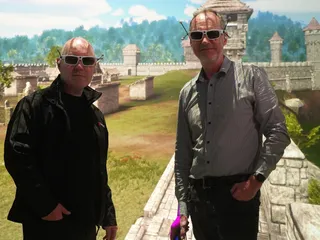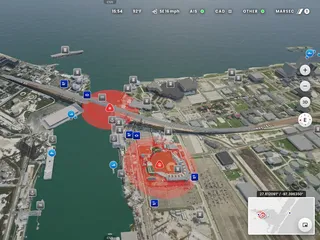Safety Critical Industries
13 January 2026 Utah National Guard opened a new medical simulation center to strengthen combat trauma training readiness.
9 December 2025
23 October 2025
16 September 2025
Search channel
Refine Search
All Safety Critical Industries News & Articles
During the Emergency Nurses Association's annual meeting in October at the Orange County Convention Center in Orlando, 40 nurses and 100 actor volunteers simulated a mass casualty terrorist attack before 3,000 people. The association had no way of knowing that a nearby nightclub just eight months later and 10... 13 June 2016
The medical simulation centre at NTNU was referred to as a “blueprint for the future of medical simulation” when Caverion Norway, the team behind the smart solution, recently won first place in two categories at the Crestron Integration Awards. Medical simulation is a teaching method that uses an advanced computer-controlled... 13 June 2016
For many people, our concept of medical emergency procedures is informed by a lifetime of consuming television medical dramas. For anesthetists and medical staff, though, the emergency sim ward offers the most realistic insight into an emergency procedure, as Teresa Crea discovers. Medical simulation—the re-enactment of a medical event—often makes... 13 June 2016
Middle school and high school students are getting an opportunity to test the water of medical professions this week at the third annual Health Career Camp at Fort Lewis College and around Durango. The event, coordinated by the Southwest Colorado Area Health Education Center, provides the 27 students a chance to... 13 June 2016
A pre-operative patient education program involving physics has approximately halved the rate of post-operative pulmonary complications in patients undergoing major elective surgery. Known as ERAS+, the multidisciplinary patient education programme was introduced at Central Manchester University Hospitals NHS Trust in September 2014. It followed an audit during the previous year. This... 13 June 2016
“Some say space is the final frontier, but I believe that the brain is the ultimate frontier” says Dr. Ryan Darcy, Brentwood '91, an acclaimed neuroscientist and entrepreneur who is currently leading a team of talented biomedical engineers, physicists, and other scientists at one of the foremost labs and... 10 June 2016
A medical simulator can be as simple as a simulated body part, say an arm, or as complex as a simulated human patient—these educational devices are used in hospitals, universities, and medical simulation centers. Designed to train all levels of health-care workers, medical simulation centers provide high-quality, realistic patient experiences—just... 9 June 2016
ASHLAND, Ohio – Two members of Ashland University’s Schar College of Nursing and Health Sciences were recipients of the 2016 BAYADA Award for Innovation in Healthcare Education. Since they were established in 2004, the BAYADA Awards have recognized nurses for their ideas enhancing technological innovation in nursing education and practice. 9 June 2016
In a major boost to healthcare services in Nagaland, a laparoscopic training centre recognized by Federation of Obstetrics and Gynaecology Society of India ( FOGSI) was formally inaugurated here at Nikos Hospital and Research Centre (NHRC) on Sunday. The launching of the laparoscopic training centre coincided with the happy tidings... 9 June 2016
Just days after the last class bell, Texas school nurses are already looking to improve and increase their knowledge for the next school year. The 2016 School Nurse Conference, sponsored by McLane Children’s Hospital Scott & White, began Tuesday morning at the Frank W. Mayborn Civic and Convention Center in... 9 June 2016
Zimmer Biomet Holdings Inc., an Indiana-based medical device company, will buy another med-device company, LDR Holding Corp., in a bid to boost its Colorado-based spinal business. Zimmer Biomet's Spine Division is headquartered in Broomfield, offering spine-related medical-device products as well as training and clinical support to surgeons. In a statement,... 9 June 2016
Waldwick — For argument’s sake, let’s say that multi-colored balloons are patient heads. And that plum tomatoes Scotch-taped on the balloons are their eyes. Now, let’s imagine 10 teams of students from all over the state trying their very best to construct hydraulic arms capable of performing cataract surgery on... 9 June 2016
Most people wouldn’t volunteer to be placed in dangerous situations, but for Jenna Fremstad it brings about a sense of comfort. A hall director at University of Wisconsin-Stevens Point (UWSP), she volunteered to be a hostage in the two-day UWSP emergency training exercise involving 27 agencies at the campus... 9 June 2016
When a catastrophe strikes, like the massive Keyport fire in April, first aid squads from several towns respond. It helps if those squads have strong preexisting relationships. That’s the idea behind the Bayshore EMS Cadet Competition, which takes place Saturday in Keyport. Cadets -- young people ages 14-18 who are interested in... 9 June 2016
QUEPOS, Costa Rica - Twenty-two Costa Rican Guarda Costas attended a recent two-day workshop conducted by Sgt. 1st. Class David Muniz and Sgt. Michael Marfia, medics from New Mexico National Guard, as part of the National Guard Bureau's State Partnership Program. The Subject Matter Expert Exchange, or SMEE, aims to... 8 June 2016
Simulation has revolutionized product design and manufacturing across many industries including automotive, aerospace, and oil and gas exploration. The ability to develop new products and test different processes in a virtual environment allows us to first explore what could be without wasting precious investments of time and money on ideas... 8 June 2016
A CIO article, “Artificial Intelligence: Humankind’s Best Chance for a Healthier Future,” makes a really good point about the past and future of medicine. Many of the greatest advances in medicine depended upon observation and almost accidental discoveries. Really smart people had to be in the right place at the... 7 June 2016
VirtaMed introduced the ArthroS™ Hip Module for the VirtaMed ArthroS™ simulator – an anatomic model that the company says looks, feels and behaves like a real hip. Surgical trainees can palpate the bony landmarks or manipulate the joint to find their way and learn to use fluoroscopic imaging in a... 7 June 2016
The Accreditation Council for Graduate Medical Education (ACGME) issued a multicenter research trial waiver and seed funding to the “Flexibility in Duty Hour Requirements for Surgical Trainees (FIRST) Trial” for the 2016−2017 academic year, based on the recommendation of the ACGME Review Committee for Surgery.” The ACGME Task Force reviewing... 6 June 2016
Continuing Education Company (CEC), a provider of live primary care continuing medical education (CME) conferences, launched CME365™, a website that offers online CME courses. The company says it created the new website in response to a growing demand for commercial-free, online medical education that makes it easy for clinicians to earn... 6 June 2016
.jpg/r%5Bwidth%5D=320/fab0dca0-d4fb-11f0-8156-1bceebaa1932-Your%20paragraph%20text%20(2).webp)

